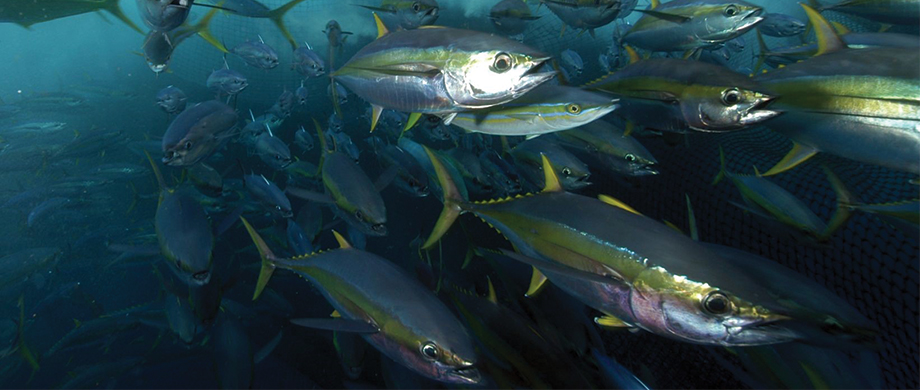Common Oceans Program to ramp up sustainable management of the high seas
New phase of GEF-funded partnership in support of sustainable fisheries and protection of marine biodiversity in the areas beyond national jurisdiction
10 December 2021

Nairobi/Rome/Washington - Oceans are essential to life on earth. They help regulate our climate and produce oxygen for us to breathe. They also provide food, jobs, energy and transport for millions of people. Yet, our oceans are in danger from overfishing, pollution, climate change and other threats that are facing the marine environment.
Over the past five years, the USD 50 million Common Oceans Program funded by the Global Environment Facility (GEF) has galvanised international momentum in support of protection and sustainable management of the oceans and their vast resources, particularly targeting the areas beyond national jurisdiction (ABNJ) – which cover over 60 percent of the world’s ocean surface.
But challenges remain, and to achieve more responsible and sustainable use of marine resources and biodiversity in the ABNJ, the GEF will continue supporting the Common Oceans Program. At its 58th Council in June 2020, the GEF endorsed an additional USD 27 million for the Program to ramp up its efforts.
"Keeping our oceans healthy is a key global challenge as reflected in FAO’s new Strategic Framework that prioritizes the protection, restoration and sustainable use of marine ecosystems," said Maria Helena Semedo, FAO's Deputy Director-General. “A continuation of this Program brings together a unique partnership that will help to bolster marine biodiversity and contribute to aspirations of the 2030 Agenda for Sustainable Development and the post-2020 Global Biodiversity Framework," Semedo added.
Making way for sustainable fisheries and healthy ecosystems in the common oceans
The Common Oceans Program is to start its second phase in 2022. It will be focused on transboundary cooperation in shared marine waters in line with GEF’s International Waters focal area. In particular, the Program will promote initiatives for sustainable tuna and deep sea fishing with reduced impacts on seabirds, cetaceans, pelagic and deepwater sharks, and conservation of ocean ecosystems like the Sargasso Sea.
The Program aims to eliminate catches from tuna stocks that are subject to overfishing, and make sure that all major tuna stocks are fished at sustainable levels by developing ‘Harvest Strategies’ to determine sustainable catch limits and reducing illegal, unregulated and unreported (IUU) fishing.
In the area of deep-sea fisheries, new ways to manage catches from stocks with unknown status – currently amounting to 25 percent of deep-sea catches – will be explored. At the same time, negative impacts on vulnerable marine ecosystems and threats to un-targeted species like deepwater sharks, will be reduced by strengthening management of 12 million hectares of marine areas that are home to key species and habitats, and promoting the use of ocean-friendly materials.
The new Program will zoom in on the Sargasso Sea, where a collaborative stewardship will work to solve identified threats and provide a demonstration of how cooperation and partnership can play a leading role in sustaining and restoring the productivity and health of this significant ecosystem.
"UNDP, working with our partners at IOC/UNESCO and the Sargasso Sea Commission, is delighted to act as the GEF implementing agency for this groundbreaking project," Andrew Hudson, Head of the Water and Ocean Governance Programme at UNDP said. "In close alignment with the Ocean Decade, this project will allow for a science-led stewardship approach for the Sargasso Sea to be developed - which we hope will inform how similar initiatives can be implemented in other high seas systems."
Another important aspect of the Program is capacity building. Key officials from regional and national organizations will participate in training programs that will allow them to exchange experiences and improve cross-sectoral collaboration on issues such as IUU-fishing, seabed disturbance, marine and land-based pollution, climate change, and cumulative impacts.
“Global coordination of the conservation and sustainable use of marine biodiversity in ABNJ is currently lacking, although progress is being made through the consideration of a new implementing agreement under UNCLOS,” said Isabelle Vanderbeck, UN Environment Task Manager for GEF International Waters. “Cross-sectoral cooperation could play a role in strengthening and enhancing ocean governance to achieve global sustainable development goals in ABNJ and the Exclusive Economic Zones (EEZs),” she added. “However, there are capacity gaps which need addressing in order to support enhanced coordination, which is the focus of the cross-sectoral capacity building project under the Program.”
The wide arrange of activities will be carefully coordinated to maximise the benefits of the extensive partnership. Results, lessons learned, and experiences will be shared with key stakeholders, the media and the public – to foster the upscaling and replication of best practices and raise awareness of the issues affecting our oceans and opportunities for more sustainable management of their resources.
“Being able to leverage our achievements is great – and very much needed,” said Alejandro Anganuzzi, Coordinator of the Common Oceans Program at FAO. “We are eager to continue working to improve fisheries management and conservation of biodiversity in our common oceans – where ecosystems remain subject to multiple threats including overfishing, IUU-fishing, habitat loss and climate change impacts,” Anganuzzi added.
About the Common Oceans Program
The Common Oceans Program is a global partnership funded by the Global Environment Facility (GEF) promoting the sustainable use of fisheries and the protection of marine biodiversity in the areas beyond national jurisdiction (ABNJ). The Program brings together three UN agencies – FAO, UNDP and UNEP – with Regional Fisheries Management Organizations, national governments, international conservation organizations, the private sector, civil society and academia.
